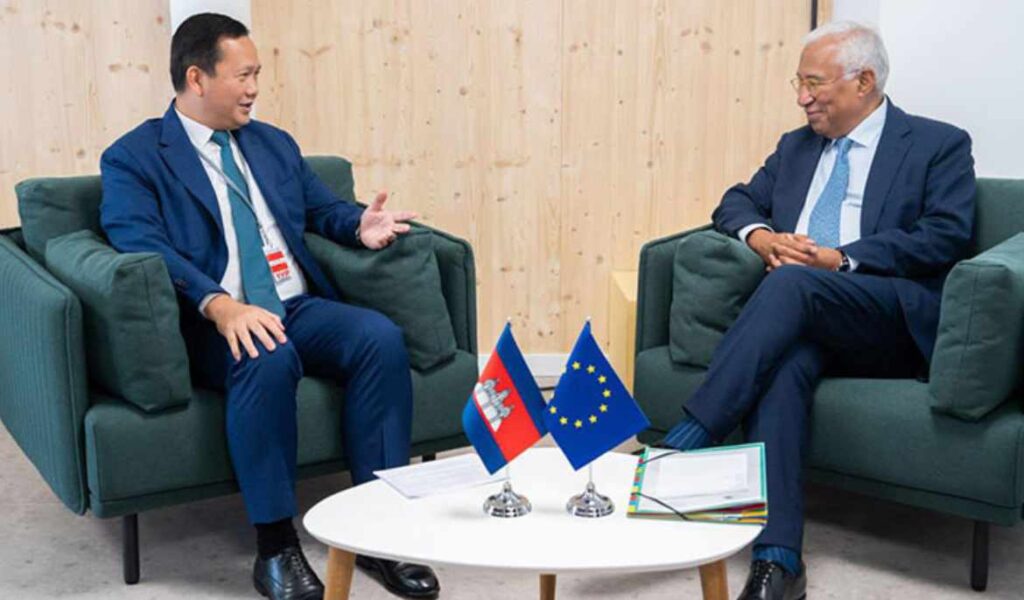Synopsis: EU seeks to deepen cooperation with Cambodia after high-level talks
The European Union (EU) has expressed strong interest in expanding relations and cooperation with Cambodia following a high-level bilateral meeting between Cambodian Prime Minister Hun Manet and European Council President António Costa on Monday.
The meeting took place on the sidelines of the 3rd United Nations Ocean Conference (UNOC3), held from June 8 to 13 in the French city of Nice.
During the discussion, Costa warmly welcomed the opportunity to engage with Mr Hun Manet , highlighting the positive relations between the EU and the Association of Southeast Asian Nations (ASEAN), particularly with Cambodia.
He praised Cambodia’s ongoing efforts to strengthen the rule of law, especially the recent progress in the adoption of the country’s new Fisheries Law.
Costa commended Cambodia’s contribution to regional development and noted the EU’s keen interest in further strengthening bilateral cooperation with the Kingdom. He expressed appreciation for Cambodia’s principled position on the war in Ukraine, emphasising that once conflict erupts, the end becomes uncertain.
In response, Mr Hun Manet thanked the EU for its significant contributions to Cambodia’s socio-economic development through joint initiatives. He spoke of Cambodia’s hope that the EU will remain a close and trusted partner, especially as the country transitions out of Least Developed Country (LDC) status in 2029.
The premier said the government is committed to tackling challenges in the fisheries sector. He noted that the new fisheries law has been approved by the National Assembly and is scheduled for Senate review later this month.
Beyond fisheries, Mr Hun Manet repeated Cambodia’s environmental pledges, including the goal of sourcing 70% of its energy from renewables by 2030 and achieving carbon neutrality by 2050—ambitious targets despite the country’s minimal contribution to global greenhouse gas emissions.
As the global geopolitical landscape faces increasing uncertainty, Mr Hun Manet said Cambodia remained committed to multilateralism. Drawing from the Kingdom’s tragic history of civil war, he emphasised the country’s deep understanding of the devastating consequences of conflict, especially the lasting impact of landmines and unexploded ordnance.
Costa extended a formal invitation to the Cambodian Prime Minister to visit EU headquarters in Brussels to continue strategic discussions aimed at strengthening Cambodia-EU ties.
Mr Hun Manet accepted the invitation with the time of the visit to be fixed later.
The EU has been a major development partner of Cambodia since the early 1990s. Over the years, EU-Cambodia cooperation activities have assisted millions of Cambodians.
The EU programmes involve Cambodians from every walk of life and take place in a wide range of areas, including education, agriculture and natural resource management, governance, human rights, public finance management, private sector development, and environment and climate change.
In a past interview with Khmer Times, EU Ambassador to Cambodia Igor Driesmans said he is committed to supporting Cambodia’s economic development and aims to elevate their growing trade relationship.
Ambassador Driesmans said that while there are differences between the EU and Cambodia, they share significant common ground, particularly regarding international legal frameworks such as the Law of the Sea and World Trade Organisation regulations.
He reiterated the EU’s commitment to working with Cambodia based on mutual respect and shared values.
But he acknowledged that there are challenges to address, particularly in the areas of governance, human rights, and democracy. The EU hopes to partner with Cambodia on these issues, which Ambassador Driesmans said are crucial for the long-term well-being of the country.
“We hope to be able to partner on governance issues and address some of the concerns that we have when it comes to human rights and democracy,” he said.
Progress in these areas would not only benefit Cambodia’s political landscape but also its economic growth, he said.
“We believe it would be in the interest of all, in the interest of the Cambodian economy and its people, he noted, signalling the EU’s intent to continue advocating for democratic reforms while promoting cooperation across a wide range of sectors.



